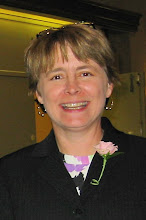During the State Bar's plenary session today, it occurred to me why it was not such a weird small world coincidence that last night in a Publix supermarket in Fernandina Beach, Florida I ran into the first person who really encouraged me to go to law school. Former Georgia Supreme Court Justice Hardy Gregory Jr. is here in Florida, in large part, because he was being honored with the Chief Justice Thomas O. Marshall Professionalism Award. In a Palsgraf kind of way, I wouldn't be on the Board of Governors at all if it was not for Hardy's embodiment of the best ideals of the legal profession.
Please bear with me because the wind up to draw these points together is a little long. But it exemplifies why Hardy is so deserving of this award and why it is a reminder to us all that we should always be on the look out as we make our way up the ladder to see if there is someone below who could use a hand up.
The first, as I mentioned, was Hardy Gregory Jr., whom I met when he was a Supreme Court justice, but got to know better after he left the court to go into practice with his friend, Gary Christy, and his mentor, T. Hoyt Davis, Jr. (I am writing this from memory and not double checking so I assume spelling and factual statements are accurate.) At the time, with Hardy coming off the Supreme Court, I wondered why a jurist of his stature would not be the lead name in the law firm of Davis, Gregory and Christy. Hardy replied something to the effect that T. Hoyt Davis Jr. was his senior and therefore he was getting top billing.
So it was with this knowledge of respect for mentors, not one's own past achievements, that I started covering the development of Hardy Gregory's practice, particularly an appellate specialty. This was before he wrote his civil practice book. But in his careful explanations to me of the issues in the cases of his that I was covering on my beat as an appellate reporter, I received real lessons in the law that were eerily reminiscent in his descriptions in the forward to his book of the study he and his mentor pursued as they mastered the Civil Practice Act after its passage. (As an aside, I may need to change this line for accuracy when I get back home and can double check Hardy's introduction to his book. I'm again relying on memory.)
For what ever reason, Hardy started encouraging me to go to law school. In the most memorable letter I received from him, a thank-you note for an article that followed up on our discussion of his case, he told me: "Law is in your blood." And he urged me to go to law school.
Actually, law was not in my blood. No one in my family, to my knowledge, had gone to law school. In fact, my mother, when I told her I had been accepted to go to law school at Georgia State, had the following reaction: "Oh, no!" This line was delivered in a deep, moaning smoker's voice and in a tone reserved for someone revealing they have just been diagnosed with an incurable disease.
But Hardy had discovered a talent in me that I didn't even realize that I had and he encouraged me to pursue it. About the same time, Justice George Carley, whom I first started covering when he was chief judge of the Court of Appeals, also started urging me to go to law school.
I was helpless, having undergone their one-two punches. I applied to Georgia State's College of Law. I was accepted, probably on the basis of the recommendation letters of a former and sitting Supreme Court justice. And with that acceptance, which led to my leaving journalism, I effectively crossed the first step leading me through the looking glass to a new profession in law.
So fast forward to today. After the meeting in which Hardy received his award, I attended the Appellate Section luncheon, where I sat with Justice Carley, and listened to the various candidates for election to the Court of Appeals talk about the genesis of their interest in becoming an appellate judge.
One candidate, Chris McFadden, spoke of his father, who was a judge, and how he instilled a kind of reverence for that profession and how it made being a judge a pinnacle of achievement.
And I thought about how the aspiration for a professional goal doesn't always have to come from a parent. It also can come from someone with a love for what they do and who has an encouraging eye out for another someone with similar interests, and perhaps, with a little development, talents. Or, spotting a bright mind who doesn't necessarily share an interest in your precise profession, but who nonetheless with encouragement could be able to find the path to a hidden talent.
In a way, this trip to the State Bar's annual meeting is a sort of harmonic convergence of the influences that took me through the looking glass and brought me to this point. And it makes me all the more cognizant of the need to keep an eye out for someone who might need a helping hand--or simply a reflective look in the mirror--to realize that achievement of their goal begins with just little boost to the next step.

I like this. This is the first time I've had a chance to read something of yours that wasn't just reporting. I hope you'll keep it up. I'd like to hear more about other people you admire, because in relating this you reveal a lot about yourself. - jim skillman
ReplyDeleteThanks, Jim. I'm hoping this blog will be a mix of reporting and personal reflections.
ReplyDelete